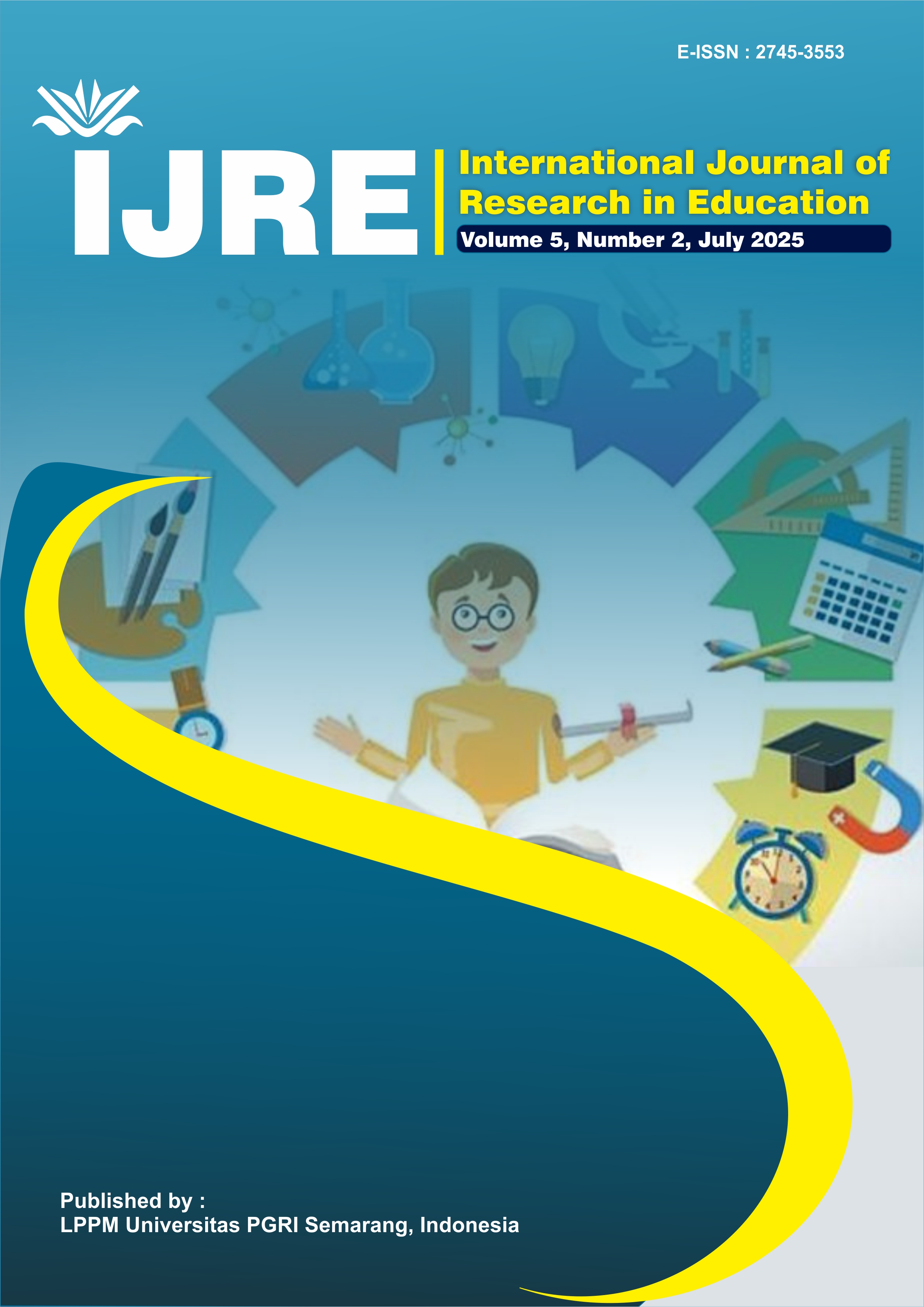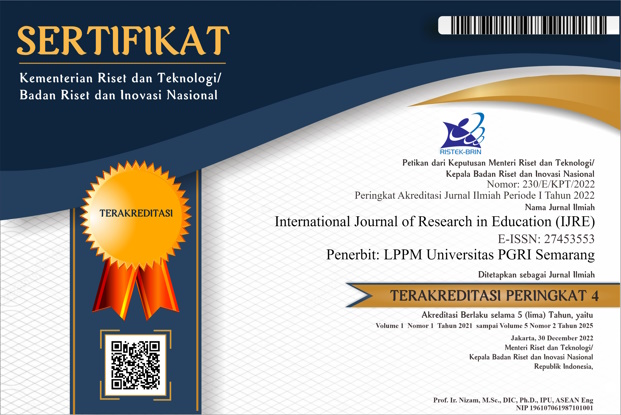Task-Based Language Learning in Action: Improving Writing Skill among Eighth-Grade Students at an Indonesian Islamic School
DOI:
https://doi.org/10.26877/jpdem495Keywords:
Task based learning, Language, Improve, Writing skillAbstract
This quantitative study investigates the efficacy of task-based learning in enhancing the English writing skills of second-grade students at Indonesian Islamic School. A total of 70 students were divided into experimental and control classes, with the experimental class receiving task-based learning instruction and the control class receiving traditional teaching methods. Pre-test and post-test assessments were administered to both classes, and student skills were evaluated using a meta-cognitive skills rubric, multiple-choice questions, and essay writing. Data analysis was conducted using descriptive statistics, including normality and homogeneity tests via SPSS and Excel. The results indicate a significant improvement in English writing skills among students in the experimental class (M = 62.43) compared to the control class (M = 60.00). The findings suggest that task-based learning is an effective instructional approach for enhancing students' English writing skills and creativity. The study's results have implications for teaching practices, highlighting the importance of incorporating task-based learning in English language instruction. The findings also suggest that task-based learning can be adapted to various educational settings, providing a valuable tool for educators seeking to improve student outcomes. Furthermore, the study's results contribute to the growing body of research on task-based learning, providing insights into its effectiveness in enhancing language skills. Overall, this study provides evidence for the benefits of task-based learning in English language instruction, and its findings have the potential to inform teaching practices and improve student outcomes.
References
Amat, E., Tejada, J. K., & Ilustre, R. (2022). Content-based and task-based language teaching in l2 classroom. *Journal of English Language Teaching and Applied Linguistics*, *4*(3), 24–34. [https://doi.org/10.32996/jeltal.2022.4.3.3](https://doi.org/10.32996/jeltal.2022.4.3.3)
Amsori, H., Nugraha, M. A., & Sibarani, J. (2022). The Effect of task based learning method using anchor podcast application on students’ speaking ability. *ELTIN JOURNAL: Journal of English Language Teaching in Indonesia*, *2001*, 67–76. [https://www.e-journal.stkipsiliwangi.ac.id/index.php/eltin/article/view/3692](https://www.e-journal.stkipsiliwangi.ac.id/index.php/eltin/article/view/3692)
Biglari, A., Izadpanah, S., & Namaziandost, E. (2021). The effect of portfolio assessment on iranian efl learners’ autonomy and writing skills. *Education Research International*, *2021*, 1–13. [https://doi.org/10.1155/2021/4106882](https://doi.org/10.1155/2021/4106882)
Bora, P. (2023). Importance of writing skill to develop students’ communication skill. *Journal for Research Scholars and Professionals of English Language Teaching*, *7*(35). [https://doi.org/10.54850/jrspelt.7.35.009](https://doi.org/10.54850/jrspelt.7.35.009)
Dao, P., Iwashita, N., Chi Nguyen, M. X. N., & Arias-Contreras, C. (2024). Teachers’ and learners’ beliefs about task-based language teaching (pp. 228–260). [https://doi.org/10.1075/tblt.16.08dao](https://doi.org/10.1075/tblt.16.08dao)
Ellis, R. (2021a). Task-Based Language Teaching (pp. 133–136). [https://doi.org/10.1007/978-3-030-79143-8_25](https://doi.org/10.1007/978-3-030-79143-8_25)
Ellis, R. (2021b). Options in a task-based language-teaching curriculum. *TASK. Journal on Task-Based Language Teaching and Learning*, *1*(1), 11–46. [https://doi.org/10.1075/task.00002.ell](https://doi.org/10.1075/task.00002.ell)
Emsawas, T., Kimura, T., Ogura, S., Morita, H., & Abdullajon, E. (2025). Identifying english proficiency by frontal theta activity during english learning. *Discover Education*. [https://doi.org/10.1007/s44217-025-00517-3](https://doi.org/10.1007/s44217-025-00517-3)
Fathia Baresh, E. (2022). Developing libyan undergraduates’ writing skills through reflective journaling: a critical literature review. *Journal of English Language Teaching and Learning*, *3*(1), 27–35. [https://doi.org/10.33365/jeltl.v3i1.1835](https://doi.org/10.33365/jeltl.v3i1.1835)
Hamad Alqasham, F., & Ahmed Mohammed Hassan Al-Ahdal, A. (2021). Effectiveness of mind-mapping as a digital brainstorming technique in enhancing attitudes of Saudi EFL learners to writing skills. *Journal of Language and Linguistic Studies*, *17*(2), 1141–1156. www.jlls.org
Jackson, D. O. (2022). Task-based language teaching. In *Task-Based Language Teaching* (Vol. 4415). [https://doi.org/10.1017/9781009067973](https://doi.org/10.1017/9781009067973)
Jedi-Sari-Biglar, L., & Liman-Kaban, A. (2023). Exploring the effect of mobile-assisted task-based learning on vocabulary achievement and student attitude. *Smart Learning Environments*, *10*(1). [https://doi.org/10.1186/s40561-023-00270-w](https://doi.org/10.1186/s40561-023-00270-w)
Khulel, B. (2022). Improving Students’ Writing Skill through Project-Based Learning, Process Writing, and Instagram. *IJECA (International Journal of Education and Curriculum Application)*, *5*(1), 25. [https://doi.org/10.31764/ijeca.v5i1.7601](https://doi.org/10.31764/ijeca.v5i1.7601)
Lesia Viktorivna, K., Andrii Oleksandrovych, V., Iryna Oleksandrivna, K., & Nadia Oleksandrivna, K. (2022). Artificial intelligence in language learning: what are we afraid of. *Arab World English Journal*, *8*, 262–273. [https://doi.org/10.24093/awej/call8.18](https://doi.org/10.24093/awej/call8.18)
Musengimana, J., Kampire, E., & Ntawiha, P. (2022). Effect of task-based learning on students’ understanding of chemical reactions among selected rwandan lower secondary school students. *Journal of Baltic Science Education*, *21*(1), 140–155. [https://doi.org/10.33225/jbse/22.21.140](https://doi.org/10.33225/jbse/22.21.140)
Nunan, D. (2004). A framework for task-based language teaching. In *Task-Based Language Teaching* (pp. 19–39). Cambridge University Press. [https://doi.org/10.1017/CBO9780511667336.003](https://doi.org/10.1017/CBO9780511667336.003)
pechenik, J. A. (2024). *A Short Guide to Writing about Biology* (Tenth). waveland press. [https://books.google.co.id/books?id=g5M4EQAAQBAJ](https://books.google.co.id/books?id=g5M4EQAAQBAJ)
Pranawengtias, W. (2022). Undergraduate students’ motivation on english language learning at universitas teknokrat indonesia. *Journal of English Language Teaching and Learning*, *3*(2), 27–32. [https://doi.org/10.33365/jeltl.v3i2.1956](https://doi.org/10.33365/jeltl.v3i2.1956)
Rhodes, J., & Brook, C. (2021). Reflective journaling and WhatsApping as part of a management degree apprentice’s action learning practice. *Action Learning: Research and Practice*, *18*(1), 75–83. [https://doi.org/10.1080/14767333.2021.1869188](https://doi.org/10.1080/14767333.2021.1869188)
Sari, Y. I., Sumarmi, Utomo, D. H., & Astina, I. K. (2021). The Effect of Problem Based Learning on Problem Solving and Scientific Writing Skills. *International Journal of Instruction*, *14*(2), 11–26. [https://doi.org/10.29333/iji.2021.1422a](https://doi.org/10.29333/iji.2021.1422a)
Sert, O., & Amri, M. (2021). Learning Potentials Afforded by a Film in Task-Based Language Classroom Interactions. *Modern Language Journal*, *105*, 126–141. [https://doi.org/10.1111/modl.12684](https://doi.org/10.1111/modl.12684)
Seyoum, W. M., Yigzaw, A., & Bewuketu, H. K. (2022). Students’ attitudes and problems on question-based argumentative essay writing instruction. *Journal of English Language Teaching and Learning*, *3*(2), 58–63. [https://doi.org/10.33365/jeltl.v3i2.2106](https://doi.org/10.33365/jeltl.v3i2.2106)
Shortt, M., Tilak, S., Kuznetcova, I., Martens, B., & Akinkuolie, B. (2023). Gamification in mobile-assisted language learning: a systematic review of Duolingo literature from public release of 2012 to early 2020. *Computer Assisted Language Learning*, *36*(3), 517–554. [https://doi.org/10.1080/09588221.2021.1933540](https://doi.org/10.1080/09588221.2021.1933540)
Sinaga, G., Amri, Y. K., & Lestari, T. (2021). Improving The ability of writing one-chapter drama text with the picture and picture learning model of viii class students SMP Negeri 1 Amandraya. *IJEMS:Indonesian Journal of Education and Mathematical Science*, *2*(2), 9. [https://doi.org/10.30596/ijems.v2i2.5489](https://doi.org/10.30596/ijems.v2i2.5489)
Subrahmanyam Vellanki, S., & Bandu, S. (2021). Engaging students online with technology-mediated task-based language teaching. *Arab World English Journal*, *1*, 107–126. [https://doi.org/10.24093/awej/covid.8](https://doi.org/10.24093/awej/covid.8)
Swaity Supervised by, S., & Mohammed Farrah, A. (2021). The effectiveness of online learning on teaching english writing skills during covid-19 pandemic at the negev schools. *June*. [http://dspace.hebron.edu:80/xmlui/handle/123456789/997](http://dspace.hebron.edu:80/xmlui/handle/123456789/997)
Wahyuni, S. (2021). Interactional approach in improving students ’ writing skills as a strengthening of the ability of religious moderation at state islamic institute of Kediri. *15*(1), 163–184.
Wen, C. H., Ying, L. C., Huat, A. T., Azlan, M. A. B. K., Shy, F. P., & Baoshun, S. (2021). The Effects of task-based language teaching and audio-lingual teaching approach in mandarin learning motivation. *International Journal of Language Education*, *5*(4), 396–408. [https://doi.org/10.26858/ijole.v5i4.19898](https://doi.org/10.26858/ijole.v5i4.19898)
Williams, T. A. (2022). A feladatközpontú nyelvtanítás (TBLT) elmélete és gyakorlata. *Magyar Pedagógia*, *122*(1), 47–61. [https://doi.org/10.17670/mped.2022.1.47](https://doi.org/10.17670/mped.2022.1.47)
Yundayani, A., & Ardiasih, L. S. (2021). Task-based material design for academic purposes: Learners’ English writing skill improvement. *Studies in English Language and Education*, *8*(1), 258–275. [https://doi.org/10.24815/siele.v8i1.18169](https://doi.org/10.24815/siele.v8i1.18169)



